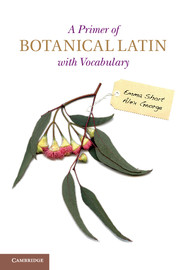13 - Translating into Latin
Published online by Cambridge University Press: 05 April 2013
Summary
Some tips
It’s good practice to get into the way of a standard sequence for describing the organs. A sound one was developed by the Flora of Australia Editorial Committee and refined through the experience of preparing volumes of the Flora of Australia (Flora of Australia Guide for Contributors, ABRS, 3rd edn 1993, p. 8). The same format was adopted for the Species Plantarum Project (Orchard, 1999). Within organs, it is best to follow the sequence of attributes: position, number, overall shape, apex, base, length, breadth, indumentum, venation, texture. There may be no need to include all attributes, e.g. those common to all species of a genus, or not relevant to a particular organ. For leaves, the lamina is usually described before the petiole and stipules; for stamens, the filaments before the anthers; for the pistil, the ovary before the style and stigma.
Avoid unnecessary articles (the, a, an). Use a short or plain-English word rather than a long or technical one of the same meaning, e.g. warty (not verrucose), funnel-shaped (not infundibuliform), jointed (not articulate). You want the reader to understand what you are saying, not close the book. Likewise, use ‘standard’ botanical Latin rather than try to be erudite by using a classical word, e.g. porca (adj. porcatus) or crista (adj. cristatus) for ridge(d), not columen which, when declined, can look like a misspelling of column. Avoid unnecessary words, e.g. ‘leaves lanceolate with entire margins’ may be written as ‘leaves lanceolate, entire’; ‘altogether glabrous’ is a tautology. Be aware of terms that have both a general and a particular meaning, e.g. pubescence (a useful general term for hair-covering is indumentum, or just say ‘hairy’).
- Type
- Chapter
- Information
- A Primer of Botanical Latin with Vocabulary , pp. 89 - 100Publisher: Cambridge University PressPrint publication year: 2013



